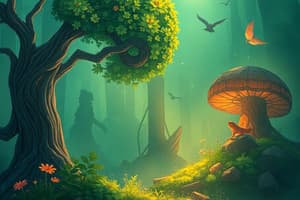Podcast
Questions and Answers
Which of the following statements accurately describes the concept of an ecosystem?
Which of the following statements accurately describes the concept of an ecosystem?
- An ecosystem is a collection of different species living in the same geographical area.
- An ecosystem is a term used to describe the interactions between predators and prey within a specific habitat.
- An ecosystem is a term used to describe the competition between different species for resources in a particular area.
- An ecosystem refers to the complex network of living organisms and their physical environment interacting as a functional unit. (correct)
Which of the following interactions involves one species benefiting at the expense of the other?
Which of the following interactions involves one species benefiting at the expense of the other?
- Parasitism (correct)
- Symbiosis
- Herbivory
- Competition
In the context of food webs, what is the primary role of carnivores?
In the context of food webs, what is the primary role of carnivores?
- To form symbiotic relationships with other species in the ecosystem.
- To provide food resources for herbivores.
- To compete with other carnivores for limited resources.
- To control the population of herbivores through predation. (correct)
Which of the following describes a mutualistic symbiotic relationship?
Which of the following describes a mutualistic symbiotic relationship?
What is the primary factor that determines the distribution and abundance of species within ecosystems?
What is the primary factor that determines the distribution and abundance of species within ecosystems?
Which of the following is an example of mutualism?
Which of the following is an example of mutualism?
How can species coexist in an ecosystem?
How can species coexist in an ecosystem?
Which human activity can directly impact ecosystem interactions?
Which human activity can directly impact ecosystem interactions?
What is a potential indirect human impact on ecosystem interactions?
What is a potential indirect human impact on ecosystem interactions?
Why is understanding ecological interactions important?
Why is understanding ecological interactions important?
Flashcards are hidden until you start studying
Study Notes
Ecology: Understanding Ecosystem Interactions
Introduction
In ecology, understanding ecosystem interactions is crucial to understand how species coexist and thrive in their respective habitats. These interactions involve complex relationships between organisms that determine the distribution of resources, competition for those resources, predation, and symbiosis. In this context, ecosystem refers to the complex network of living organisms and their physical environment that interact with each other to form a functional unit.
Types of Ecological Interactions
Carnivory & Herbivory
Carnivores are animal species that primarily feed on other animals, while herbivores consume plants and other vegetation. These dietary habits create distinct roles in ecosystems, where predators control herbivore populations, maintaining balance within the food web.
Symbiosis
Symbiosis is a relationship between two different species, often involving mutual benefits. Examples include lichens, where algae provide food for fungi, and the fungi protect and support the growth of the algae.
Parasitism
Parasites rely on their hosts for essential resources such as food or shelter. Protozoans of the genus Plasmodium, which cause malaria in humans, are an example of parasitism where the definitive host is the Anopheles mosquito.
Competition & Coexistence
Competition is a major factor in determining species distribution and abundance within ecosystems. Species must find ways to coexist, either by specializing in different resources or by using different strategies to acquire resources.
Mutualism
Mutualism is a type of symbiosis where both species benefit from the relationship. An example is the relationship between bees and flowers, where bees collect nectar and pollen, and flowers receive pollination in return.
Human Impact on Ecosystem Interactions
Humans have a significant impact on ecosystem interactions, either directly through overfishing or hunting or indirectly through habitat destruction and pollution. Overfishing can lead to the extinction of fish species, affecting other ecosystems that rely on them. Human-induced climate change also alters ecosystem interactions, causing shifts in species distribution and abundance.
Conclusion
Ecological interactions are complex and diverse, shaping the structure and function of ecosystems. Understanding these interactions is essential for predicting how ecosystems will respond to human activities and environmental changes.
Studying That Suits You
Use AI to generate personalized quizzes and flashcards to suit your learning preferences.




